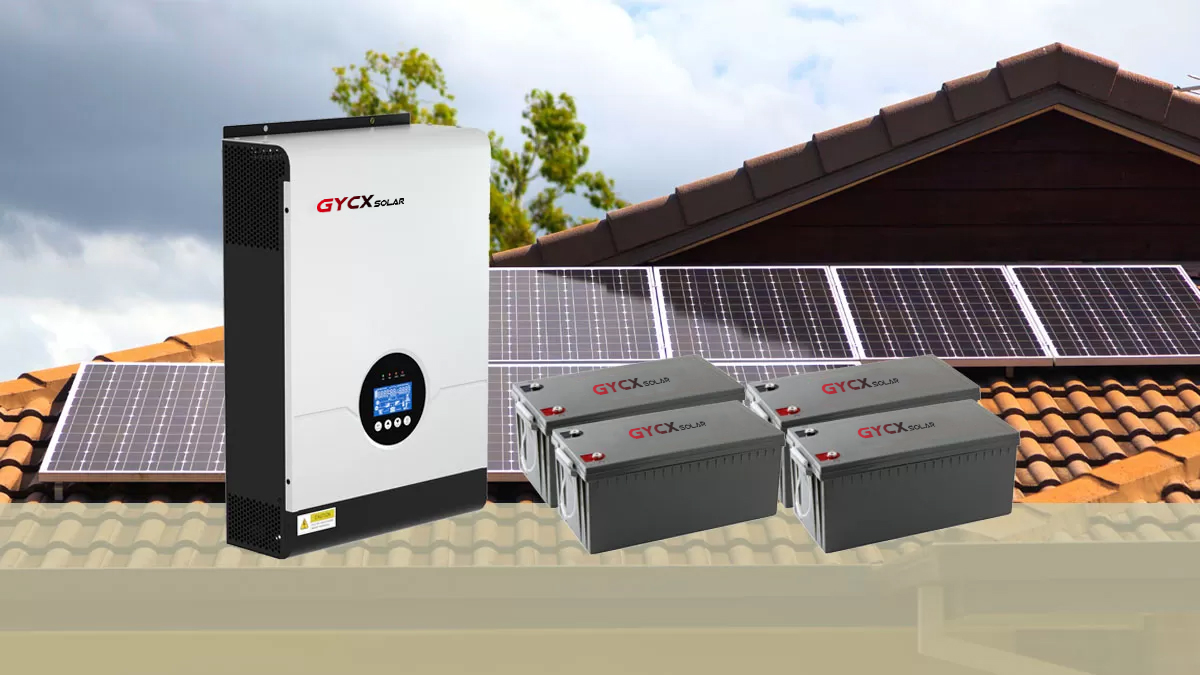
In the face of many batteries, we are confused about choosing the right battery for our specific needs, especially for enterprises that are highly dependent on energy. Choosing the best batteries requires in-depth planning of the power needs of the business and comparing it to the five available batteries options.
Therefore, in this article, we compare different types of solar battery and provide a range of information on how to choose the best solar cell based on factors such as cell capacity, application, efficiency, lifetime, cost, maintenance, and safety.
Definition of Solar Batteries
Solar batteries, also known as solar storage systems or solar mobile power supplies, can store the electricity generated by solar panels for use when we need it later. Solar cells store electricity when the sun is shining, and at night, the stored electricity is available for us to use.
What are The Application Scenarios of Solar Batteries?
Solar batteries work by relying on the free sun, an abundant renewable energy source. For individuals and businesses looking to reduce their use of fossil fuels and reduce their carbon footprint, solar batteries are a great option.
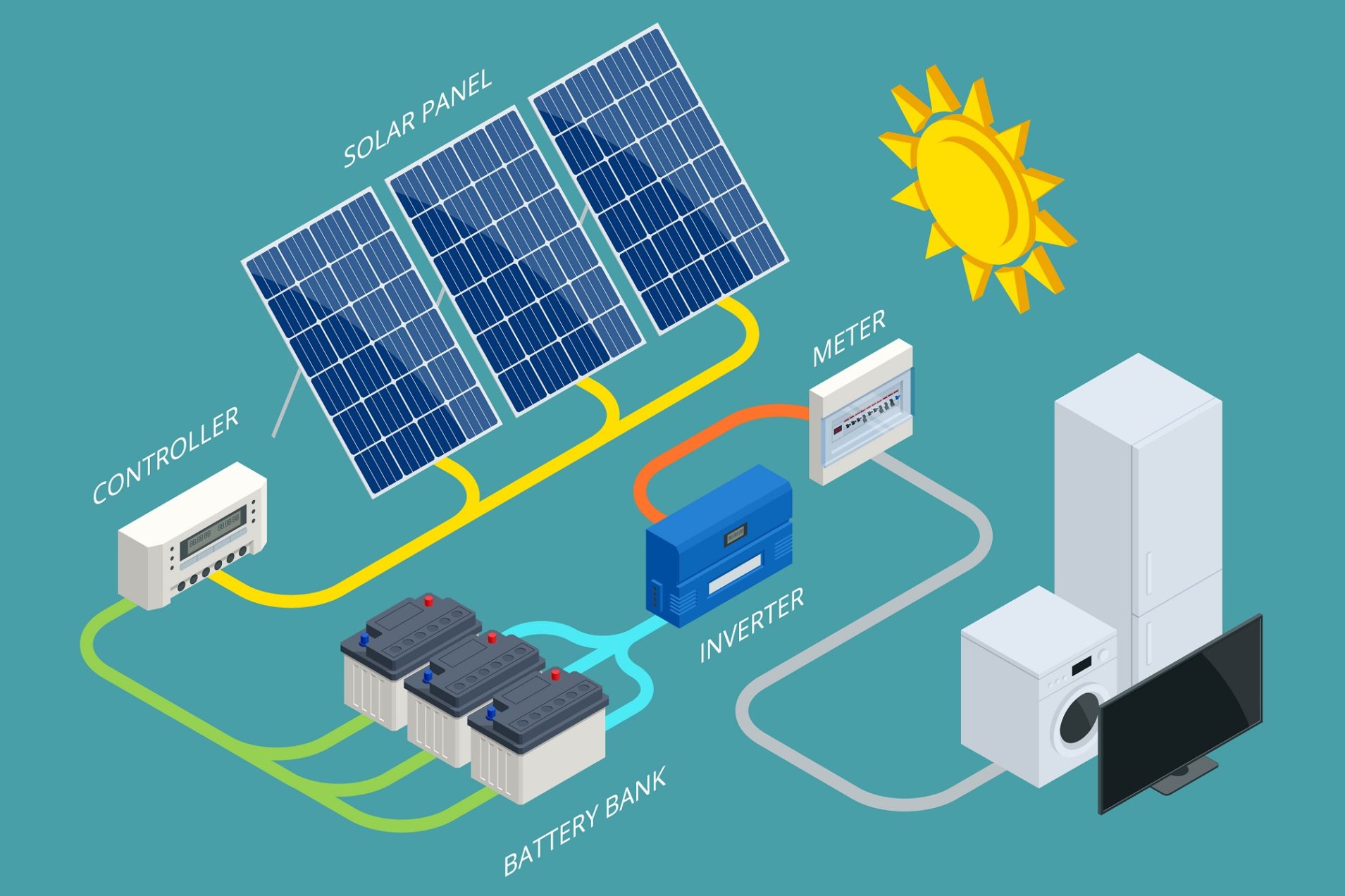
The use of solar batteries is very wide, whether it is small residential facilities, large commercial or utility projects can be powered. The application scenarios of solar battery also include: household appliances, LED lighting, industrial equipment, energy storage systems, power inverters, power grid support, etc., can use solar cells.
Types of Solar Batteries
There are several types of solar batteries, including liquid-filled and sealed lead-acid batteries, LiFePO4 solar battery, lithium-ion batteries, nickel-cadmium batteries, and flow batteries. Each solar cell has its own advantages, and each has the most suitable occasion for use.
Lead-acid Batteries
The lead-acid battery in the solar system is the same as the battery we usually see, which contains lead plates and sulfuric acid electrolyte. When sulfuric acid reacts with the lead plate, an electric current is generated. These batteries are usually relatively inexpensive, so they are common in a variety of places.
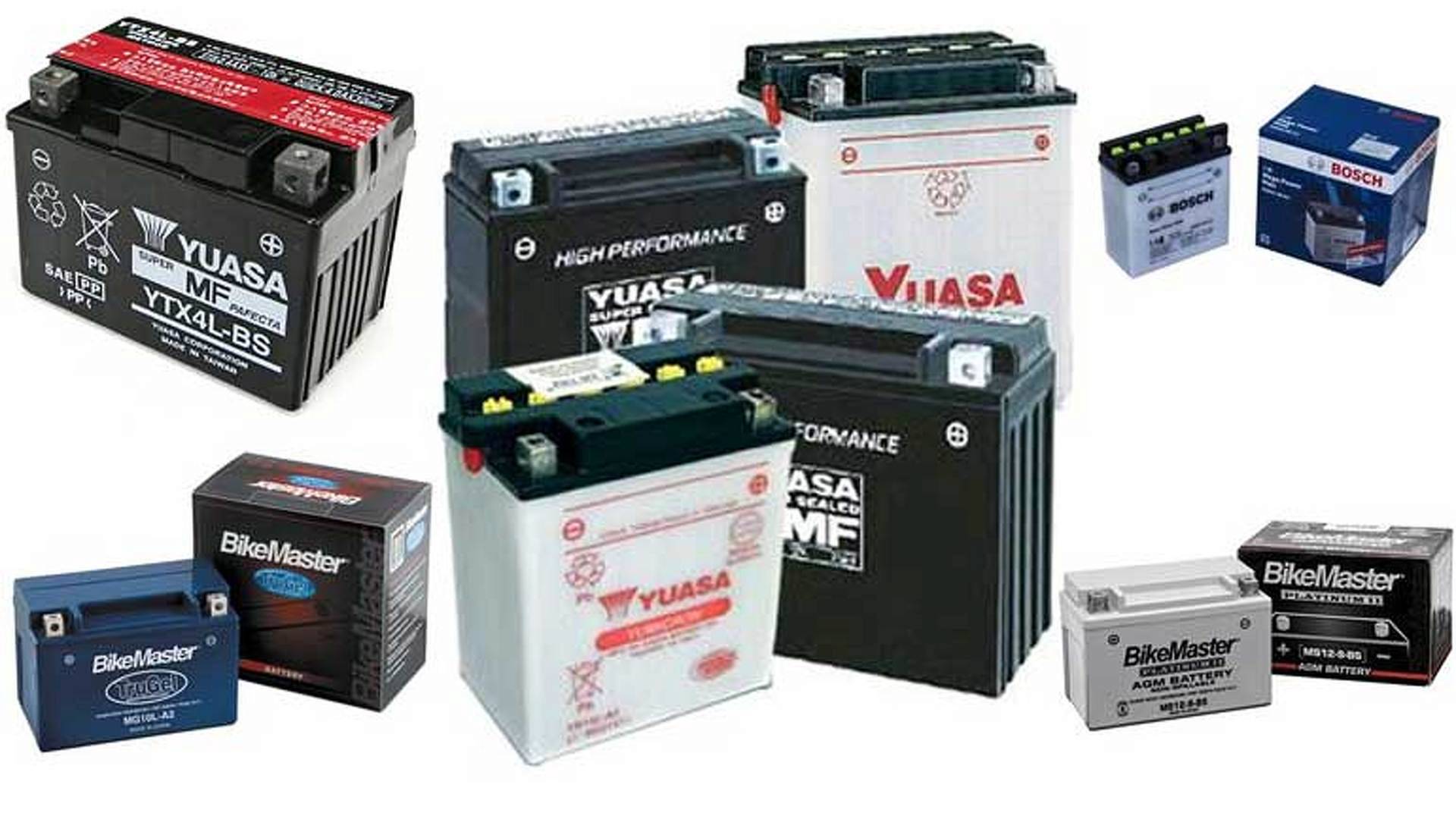
There are two kinds of lead-acid batteries, one is called liquid filled, that is, we can add electrolyte to it. The other is called a sealed battery. This battery is closed and we can’t add electrolyte to it. Both batteries have their own advantages and applications.
Advantages of lead-acid batteries
High safety: Although liquid-filled lead-acid batteries may have a risk of leakage, there is another type of lead-acid battery, called gel solar cells, which are safe because they do not have any liquid electrolytes in them, so there is no leakage or overflow problem.
Affordable: Lead-acid batteries are one of the most affordable options for solar energy storage. They are cheap and versatile. It has been used for decades in a variety of different scenarios, which is why it is so popular in the business sector, especially small businesses.
High recyclability: The advantage of lead-acid batteries is that they are highly recyclable and can be reused for a variety of purposes. Up to 80% of the lead contained in many lead-acid batteries can be recycled.
Good reliability: The reliability of lead-acid batteries is also recognized, they have a long-term reliable performance record, which is why they will become the first choice for many important occasions.
Temperature adaptability: Lead-acid batteries can adapt to a variety of temperatures and are suitable for use in hot and cold climates.
Disadvantages of lead-acid batteries
Limited life: Lead-acid batteries have a limited life, usually lasting 3-5 years. Every few years, you may need to replace the battery.
Maintenance required: If you are using a liquid-filled lead-acid battery, then you may need to regularly check the battery water level and clean the battery terminals. Although gel-type and sealed lead-acid batteries require less maintenance, they cannot be completely ignored.
Slow charging and discharging: Lead-acid batteries charge and discharge more slowly than other types of batteries used in solar systems. This means that they may not be suitable for situations that require rapid charging and discharging.
Lithium iron phosphate battery
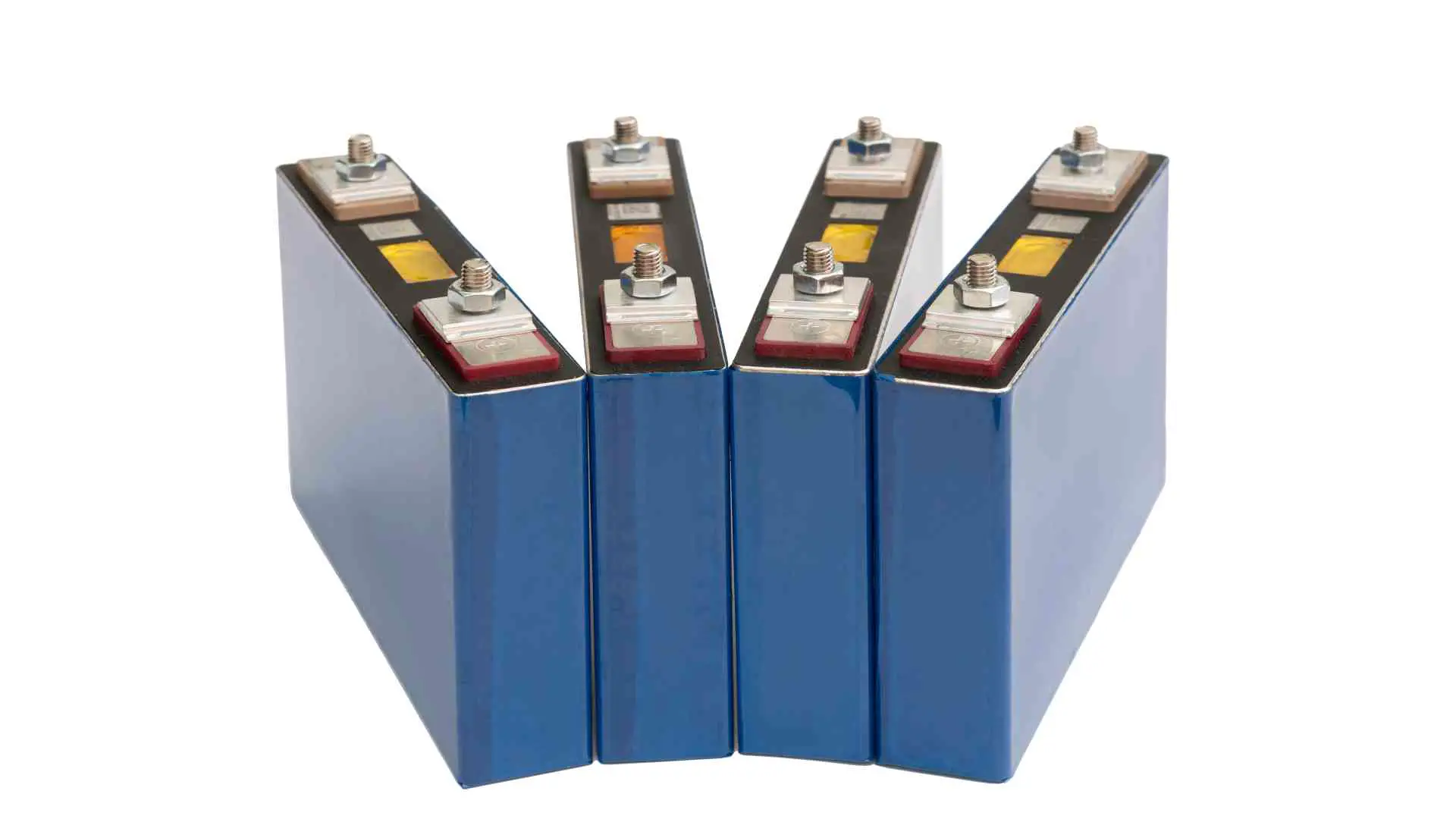
LiFePO4, which is what we usually call a lithium iron phosphate battery. It is considered to be the best type of battery used in solar power generation systems. They are a lithium battery that uses LiFePO4 as the cathode material, which has several advantages over other types of lithium batteries.
Advantages of lithium iron phosphate battery
Long cycle life: LiFePO4 batteries have a long cycle life, although multiple charges and discharges do not degrade their performance. This means you can use it for a longer period of time without worrying about battery performance degradation.
High energy density: The LiFePO4 battery has a high energy density, that is, it is small in size. Allowing them to store a lot of energy in a small, lightweight package. This makes it ideal for portable electronics and solar systems.
Temperature adaptability: The LiFePO4 battery can operate over a wide temperature range, whether it is hot summer or cold winter, it will not experience significant performance degradation.
High safety: compared to ordinary lithium-ion batteries. LiFePO4 is safer because it is less likely to overheat or catch fire. This is due to its chemical stability and the use of non-flammable electrolytes.
Fast charging: LiFePO4 batteries can be charged quickly and efficiently, making them a convenient choice for portable devices and solar systems that require fast charging.
Disadvantages of lithium iron phosphate battery
High cost: LiFePO4 batteries are generally more expensive than other types of batteries. However, they have a longer cycle life, higher energy density and are more cost-effective in the long run.
Lower voltage: LiFePO4 batteries have a lower voltage than other types of batteries, such as lead-acid batteries. This means that if you want to reach the same voltage level, you may need more batteries, which makes your system more complex and increases the overall cost.
Scope of application: Lithium iron phosphate batteries are most suitable for portable solar systems, backup power supplies, electric vehicles and other places. This is because these applications require lightweight, efficient, and safe batteries.
Lithium ion battery
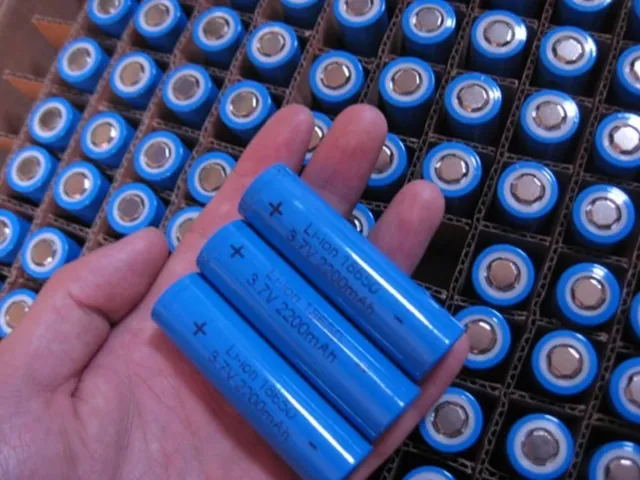
At present, lithium-ion batteries are the most popular type of battery. To increase voltage or capacity, we usually connect multiple lithium-ion batteries in series or parallel. It is designed to store the energy generated by solar panels during the day and release it when needed.
In general, lithium-ion solar cells are like a warehouse of energy, which stores energy when it is generated by solar panels and releases energy when it is needed, so that we can use solar energy at any time.
Advantages of lithium-ion batteries
Longer life: Lithium-ion batteries last longer than many other types of batteries. Depending on the use, they can last up to 10 years or more. This means you don’t need to replace the battery as often, saving on cost and time.
High energy density: Lithium-ion batteries have a very high energy density and can store a lot of energy in a small space, which is very suitable for solar power generation systems with limited space.
Fast charging: Lithium-ion batteries can be charged quickly, which is very beneficial for solar systems because it can shorten the charging time when there is less sunlight. In addition, they don’t have any memory effect, meaning that you don’t need to wait until the battery is fully discharged to charge it, which makes it more convenient to use.
Disadvantages of lithium-ion batteries
Temperature sensitivity: Lithium-ion batteries are sensitive to temperature changes, and if the temperature is too high or too low, their performance will be affected or even damaged.
Safety concerns: Lithium-ion batteries can pose a safety risk if not used and stored correctly. Lithium-ion batteries can be dangerous if used and stored incorrectly. If the battery is damaged or perforated, it may catch fire or explode.
Difficult to recycle: Lithium-ion batteries are difficult and costly to recycle, raising environmental issues and waste management issues. Lithium-ion batteries have a long service life, but eventually they need to be recycled. However, the process of recycling lithium-ion batteries is difficult and expensive, raising environmental issues and waste management issues.
Nickel-cadmium battery
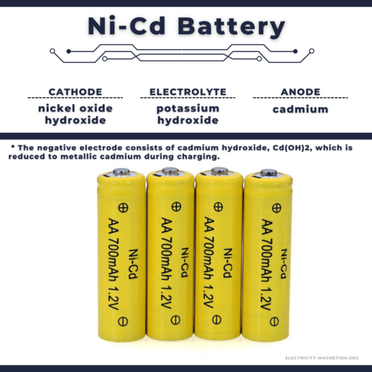
Nickel-cadmium (Ni-Cd) batteries are a common rechargeable battery that uses nickel hydroxide and cadmium metal as electrodes and potassium hydroxide as electrolytes. This is like a small energy store that can provide electricity when needed.
Advantages of nickel-cadmium batteries
Long cycle life: Nickel-cadmium batteries have a long cycle life, which means you can charge and discharge them multiple times before replacing them.
Wide temperature range: Nickel-cadmium batteries can operate normally at a variety of temperatures, whether in hot summer or cold winter, they are able to provide stable power.
High discharge rate: Nickel-cadmium batteries can provide a high discharge rate, that is, they can provide a large amount of electricity in a short period of time.
Low self-discharge rate: Nickel-cadmium batteries have a very low self-discharge rate, which means that they can hold a charge for a long time even if they are not used for a period of time. This allows them to maintain good performance even when the power supply is unstable or intermittent.
Disadvantages of nickel-cadmium batteries
High maintenance: Nickel-cadmium batteries require regular maintenance, including regular deep discharge cycles, to prevent memory effects and maximize their service life.
Toxicity issues: Nickel-cadmium batteries contain a number of toxic chemicals, including cadmium and nickel, which can be hazardous to our health and the environment if not handled properly.
Low energy density: Although nickel-cadmium batteries can operate in extreme climatic conditions, their energy density is relatively low. For a given amount of energy storage capacity, they are larger and heavier.
Flow Battery
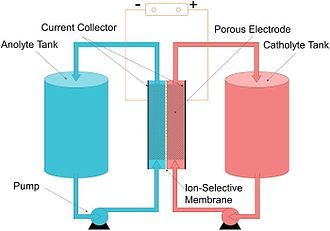
A flow battery, also known as a REDOX flow battery, is a rechargeable battery that uses two chemical components dissolved in a liquid and separated by a membrane.
Advantages of flow batteries
High efficiency: The flow battery has a high efficiency. They can convert large amounts of stored energy into usable electricity.
Long service life: Flow batteries have a long service life because the liquid electrolyte can be easily replaced without affecting the overall performance of the battery. This makes them a cost-effective option in the long run.
Good safety: Flow batteries are considered safer than other types of batteries. This is because the chemicals used in flow batteries are mostly non-toxic and non-flammable. This greatly reduces the security risks that may occur during use.
Disadvantages of flow batteries
Lower energy density: Flow batteries have a lower energy density than other types of batteries, which means they are larger and heavier for a given amount of energy storage capacity.
Higher cost: Due to the complex structural design of flow batteries and the need for additional components, they are generally more expensive than other types of batteries. This also means that if you are on a tight budget, then a flow battery may not be the best choice for you.
Limited power density: Flow batteries have a lower power density than other types of batteries, which means they may not be able to provide high power output for short periods of time. This makes them less suitable for high power output applications, such as electric vehicles or grid-level energy storage systems.
How to skillfully choose the right type of solar Batteries?
Here are some tips on how to choose the best type of solar Batteries for different businesses.
cost
When choosing solar batteries for a business, the total cost of solar batteries must be taken into account. It includes not only the upfront cost of the battery, but also its life expectancy, efficiency and maintenance requirements. If a battery has a longer life, higher efficiency, and lower maintenance requirements, it may be more economical in the long run, even if its upfront purchase cost is higher.
When choosing solar batteries for a business, the total cost of solar batteries must be taken into account. It includes not only the upfront cost of the battery, but also its life expectancy, efficiency and maintenance requirements. If a battery has a longer life, higher efficiency, and lower maintenance requirements, it may be more economical in the long run, even if its upfront purchase cost is higher.If your spot welder has a solar cell, you never have to worry about power outages in the factory.

While some types of solar Batteries are relatively inexpensive, they have a short lifespan and require regular maintenance, which costs money. If purchased, they may cost more in the long run than expensive alternatives.
Application and battery size
The first task of choosing a solar batteries is to clarify its application scenario. This includes considering the intended use of the battery, such as whether it is used in off-grid or grid-connected solar systems or as a backup power source. At the same time, the power requirements of the application scenario should also be considered, as this will affect the size and capacity of the selected battery.
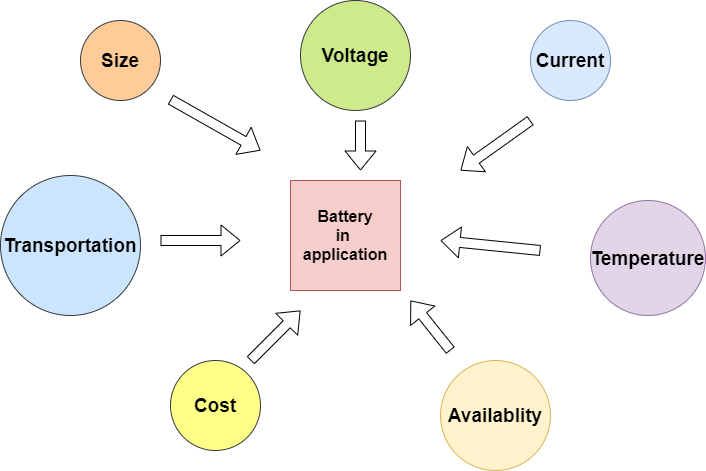
After determining the application and intended use of the battery, it is also important to choose a battery size that matches the needs. The most suitable type of battery for solar energy use is one that can both meet its intended power requirements and perfectly fit its size.
Battery capacity
Battery capacity is one of the most important factors to consider when choosing a solar batteries for a solar system. Battery capacity refers to the amount of energy a battery can store, usually in kilowatt-hours (kWh).

As a business owner, you need to choose a battery that can meet the energy needs of your business. It is important to choose a battery with the capacity to meet the energy needs of the enterprise. The size of the solar battery should be based on the amount of energy that needs to be stored to provide the required energy.
Battery life
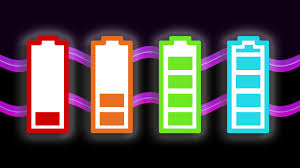
The life of the battery is an important factor to consider when choosing a solar batteries, as this will determine how long the battery will be able to provide service. The life of a battery is usually measured by the number of charge and discharge cycles a battery can go through.
Efficiency
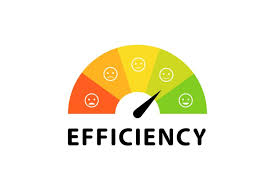
Efficiency is an important factor to consider when choosing a solar battery, as it affects how much energy a solar panel can store in the battery for later use. Choosing a more efficient battery means that the more electricity the solar panels produce, the more energy is stored in the battery.
Rated power
When choosing a solar batteries, the power rating is an important consideration, which determines the maximum amount of power the battery can provide at a given time. The power rating, usually expressed in watts (W) or kilowatts (KW), determines how much energy the battery can provide to the load or system.
The rated power of the solar batteries should be selected according to the specific requirements of the solar system used. In short, the rated power of the battery determines how much energy it can provide to the system, and should meet the energy needs of the system for different lengths of time.
Methods and strategies for selecting solar batteries
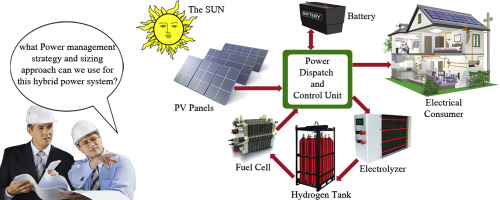
When choosing a solar batteries, you first need to understand your energy needs. In the United States, for example, the average annual electricity consumption of U.S. residents in 2021 will be 10,632 KWH, or about 886 KWH per month on average. Knowing your average energy consumption helps determine the ideal battery capacity, or how much energy a battery can store. In home solar systems, lithium-ion batteries are considered ideal because of their long life and suitable for daily charging. Lead-acid batteries are more suitable as backup power systems for occasional use, or for off-grid systems.
Household batteries can be classified according to how they interact with solar panels. The DC-coupled battery uses the same inverter as the solar panel, with both systems connected to the DC side. Ac coupled batteries have a separate inverter that connects directly to the AC power supply in the home.
If there is a hybrid inverter, only DC coupled batteries can be used. If the solar panel is equipped with a conventional inverter that cannot handle energy storage, an AC-coupled battery with a dedicated inverter is required. If you plan to use the battery as a backup power source, check its specifications to ensure that it can operate off-grid.
GycxSolar: Has the best type of battery for solar energy
GycxSolar produces high quality solar cells of different types and sizes. We are a leading company with different types of solar cells and systems.
GycxsSolar has the highest quality and most popular types of solar system cells. The battery includes the following:
Stackable Lithium Battery
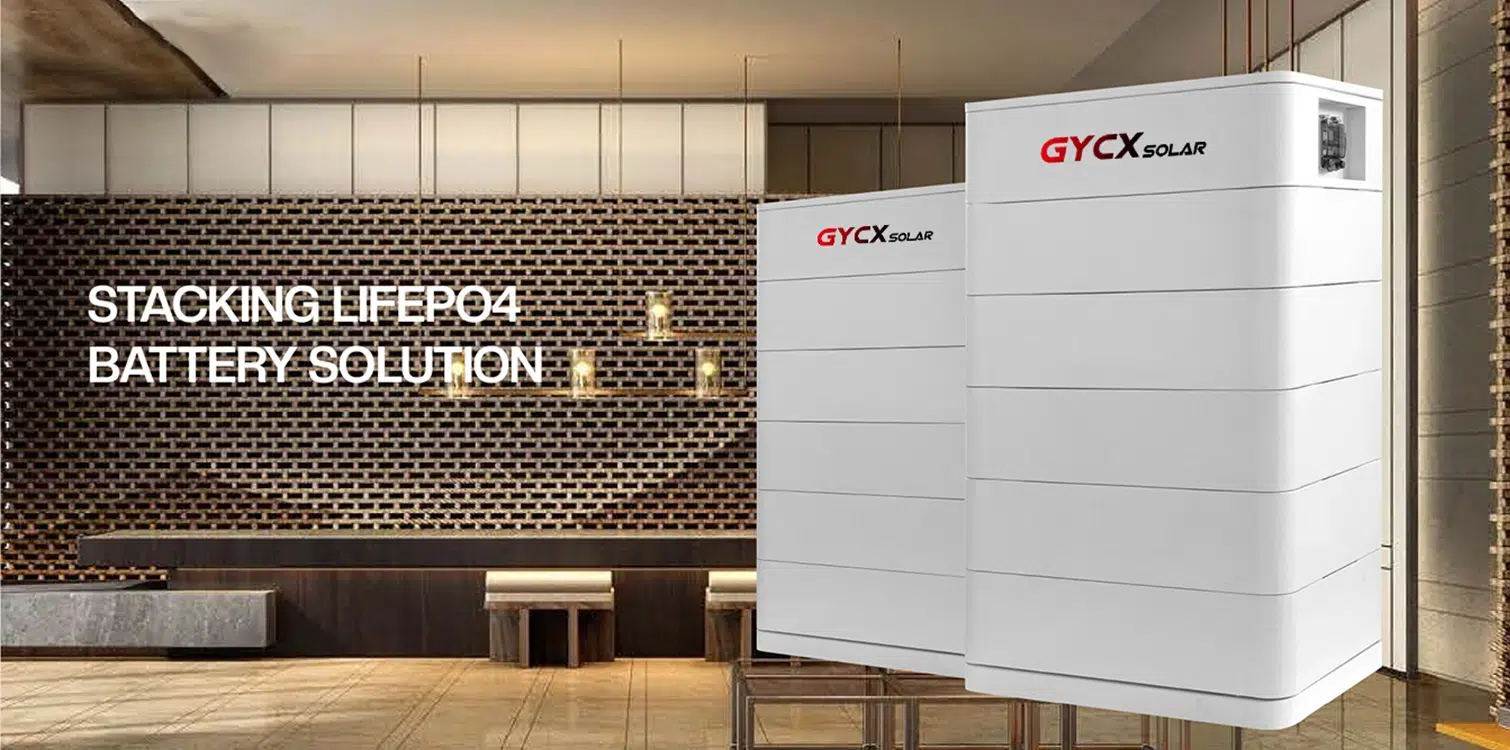
GycxSolarr’s stackable lithium battery system is an efficient, flexible and safe solar energy solution. It utilizes the latest lithium battery technology to maximize the use of solar energy. Users can add batteries at any time according to the growth of energy demand, which can be stacked up to five battery modules. In addition, it has safety features such as overcharge and overdischarge protection. Its available capacities range from 5.12 kWh to 52.74 kWh and voltages from 51.2V to 307.2V, providing a wide range of options.
Wall Mounted Lithium Battery
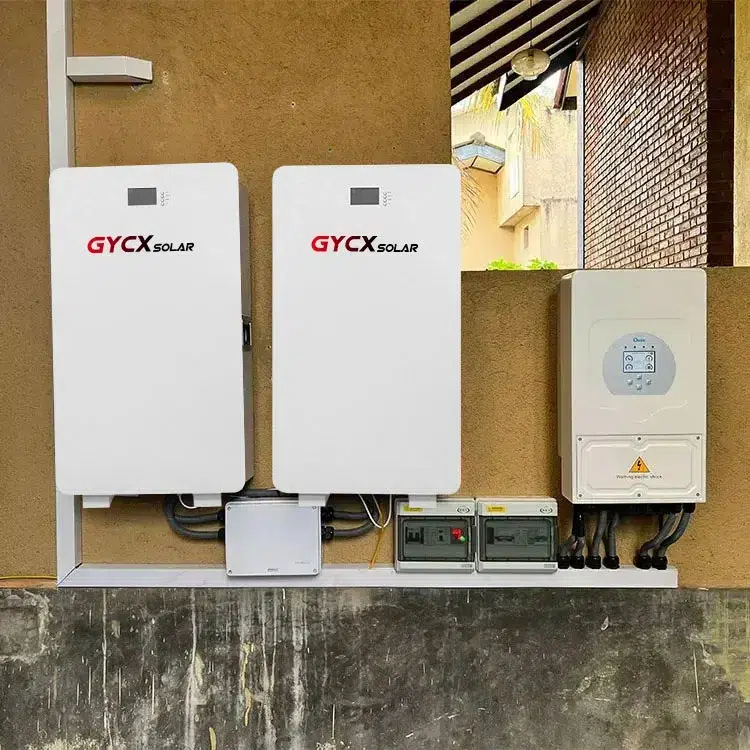
Wall-mounted solar cells integrate into home life with their optimized space use and superior energy capacity. Through an intuitive monitoring interface, users can keep track of energy usage and system performance in real time. During power outages, these batteries provide a reliable backup power source, ensuring the normal operation of basic household appliances and equipment.
Server Rack Lithium Battery
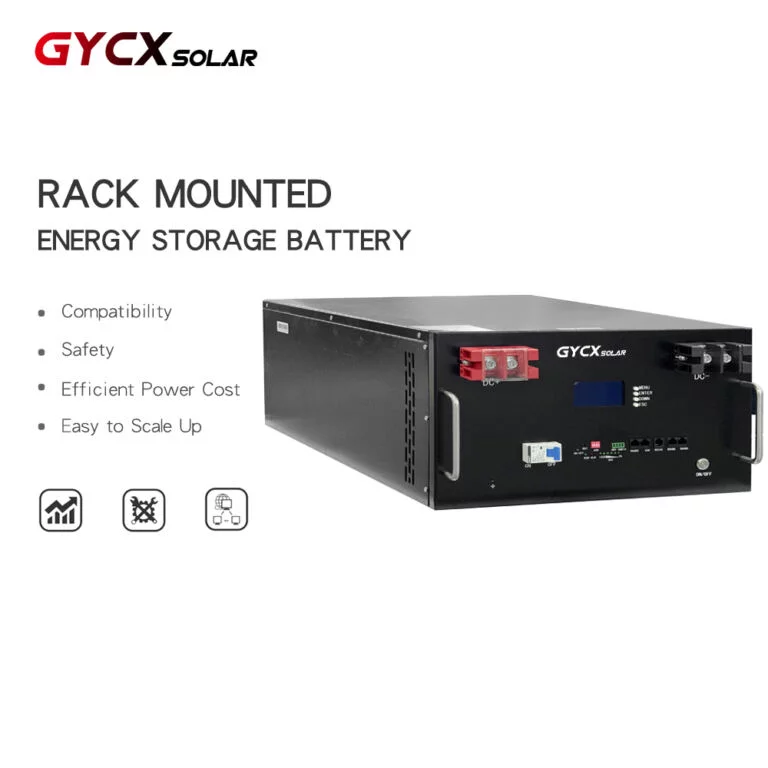
Our 48V cabinet lithium battery is a high power density and seamless integration capability that breaks traditional boundaries. It is widely used in the residential and commercial sectors, providing reliable backup power and real-time monitoring to help users redefine energy patterns. In addition, it has intelligent management functions that can monitor and control energy in real time, supporting green energy use.
BESS Design Lithium Battery
Our advanced BESS systems enable superior energy storage and discharge capabilities. It maximizes space efficiency and can be easily integrated into your existing energy infrastructure. You can trust GYCX Solar’s BESS with long-lasting performance and advanced safety features that guarantee its reliability and durability.
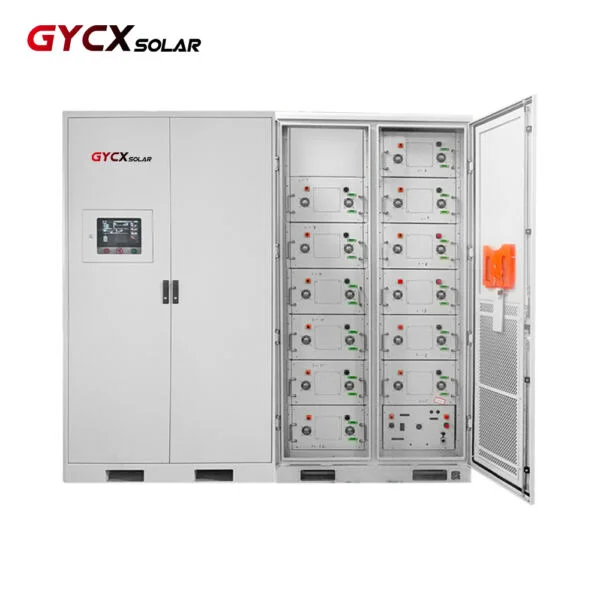
Gel Lead Acid Battery
Our gel lead-acid batteries integrate the characteristics of the energy system to provide reliable power storage. It has twice the capacity of ordinary batteries and has stronger support. It has a longer service life, rechargeable voltages including 12v and 24V, the battery type is lithium-ion LiFePo4 battery pack, there are multiple capacity options, and the maximum discharge current is ≤100A.
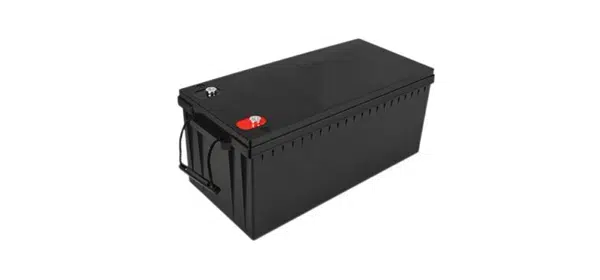
AGM Lead Acid Battery
The key benefits of our AGM lead-acid batteries, which are long-lasting, include twice the capacity of a typical battery, greater support capacity, automotive grade lithium batteries, and 100% protection. The battery has a voltage of 12.8V, a maximum charging current of 100A, and is particularly long in its cycle life.
Conclusion
The LiFePO4 battery is widely considered to be one of the best types of solar cell due to its advantages of high energy density, long life, safety, high efficiency and environmental protection. However, of all five types of solar batteries, the one that is most suitable for its purpose is the best battery.
https://gycxsolar.com/GycxSolar batteries can be used with most well-known inverters on the market. If you are a dealer or installer of these inverters, then GYCX will be the right choice for you.
GET A QUOTE NOW
Frequently Asked Questions
Which battery is best for solar energy?
Lithium-ion batteries are considered the best choice for home solar power systems because they achieve a long service life even when charged daily.
What are the main disadvantages of storing solar energy in batteries?
Solar cells have advantages and disadvantages, such as high upfront costs, energy loss when charging, and hot weather that affects life. But high-quality batteries that are professionally installed are usually durable and often come with a 10-year warranty.
What is the average cost of a solar batteries?
Prices vary by brand and model, but average around $800 to $1,000 per kilowatt-hour battery capacity.
